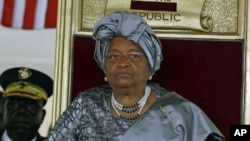Liberian President Ellen Johnson Sirleaf has taken the oath of office for a second term, promising more reconstruction and reconciliation in a country still recovering from a long civil war.
President Sirleaf's supporters cheered her second inauguration Monday on the grounds of Liberia's capitol in Monrovia, as the Nobel Peace Prize winner called for a restoration of hope after years of division and conflict.
“Today, we can state with conviction that our country has turned the corner," she said. "Liberia is no longer a place of conflict, war, and deprivation. We are no longer the country our citizens want to run away from, our international partners pity, and our neighbors fear. We have earned our rightful place as a beacon of democracy."
Sirleaf was re-elected late last year in a vote marred by violence and an opposition boycott of the second-round run-off over allegations of electoral fraud. She called this second post-war election more critical than the first, explaining that it establishes a routine of democracy for subsequent elections.
"The first takes place on the world stage in the spotlight with great fanfare," she said. "But the second election is the true test of the will of the people and the institutions they have created."
Challenges remain despite accomplishments
Widely credited with building roads and improving infrastructure during her first term, Sirleaf's efforts to reconcile Liberia's deep divisions have been less successful. Emphasizing national unity as a second-term priority, she welcomed her opponent in last year's vote, former justice minister Winston Tubman, who sat in the first row of the audience on the capitol grounds, his party having canceled plans to boycott the ceremony.
Sirleaf said her plans for reconciliation are based on economic justice.
"The cleavages that led to decades of war still run deep, but so, too, does the longing for reconciliation -- a reconciliation defined not by political bargaining or by an artificial balance of power by tribe, region, religion or ethnicity, but by the equality of opportunity and a better future for all Liberians," she said.
Sirleaf supporter Eric Monger said the president is better prepared for a second term.
"Looking at what she has done for the country the past six years, I think the second term she will do much better because now she has already laid the foundation," said Monger. "The implementation has started already."
Voter Solomon Weah backs the opposition Congress for Democratic Change party and believes Sirleaf lacks the electoral mandate to soothe Liberia's divisions.
"The re-election of President Sirleaf will not be able to reunify Liberians," he said. "At the moment, we are still divided after the election. We still feel that President Sirleaf hijacked the elections. Her government is not legitimate. And with that, I don't see how she can be able to reunify Liberians."
U.S. Secretary of State Hillary Clinton attended Monday's inauguration along with heads of state from Benin, Ivory Coast, Sierra Leone, Senegal and Guinea. Secretary Clinton praised President Sirleaf's moves to reach out to political opponents.
Citing her own party primary loss to President Barack Obama in 2008, Clinton said there has to be recognition that, in elections, sometimes you win and sometimes you lose. Yet, she said, she agreed to work with the person who defeated her, because patriotism means putting the common good before personal and political interests.
Liberian President Begins Second Term




